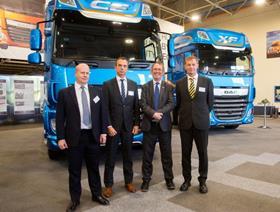
The first partially driverless lorries in the UK could be on the roads from 2018 in a move that would revolutionise the logistics industry, the government has announced.
A new £8.1 million trial commissioned by the Department of Transport will test linked automated HGVs, known as platoons, in real-world conditions, drawing on evidence from similar projects in the Europe and the US.
The trial, which will be run by transport innovation company TRL in partnership with logistics giant DHL, will look at the requirements of UK roads, fuel efficiency, acceptance by drivers and the commercial case for adoption.
Taking place from 2018, the on-road trials will form part of regular DHL logistical operations and will follow a programme of driving simulations, training and test track trials over the coming months.
“The UK has an unprecedented opportunity to lead the world in trialling connected vehicle platoons in a real-world environment,” said TRL chief executive, Rob Wallis.
Transport Minister Paul Maynard said: “Advances such as lorry platooning could benefit businesses through cheaper fuel bills and other road users thanks to lower emissions and less congestion. But first we must make sure the technology is safe and works well on our roads, and that’s why we are investing in these trials.”
Jim O’Sullivan, Highways England chief executive, said the trial has the potential to demonstrate how greater automation of HGVs can deliver better journeys for road users and reduction in vehicle emissions.
The HGV platooning project adds to TRL’s growing programme of innovation in transport, including highly-automated, self-driving vehicles, intelligent, connected infrastructure, low carbon technologies,e lectrification and shared mobility services.
Platooning involves two or more vehicles connected with ‘vehicle to-vehicle communication’, allowing them to effectively communicate with each other and operate as a single unit.
The lead vehicle takes control of the speed and direction of all the vehicles in the platoon, when the lead vehicle brakes the following vehicles automatically brake with zero reaction time significantly increasing road safety.
The constant controlled speed delivers fuel savings and environmental benefits through the reduction of CO2 emissions, while the ability to decrease the distance between vehicles increases road network capacity.



